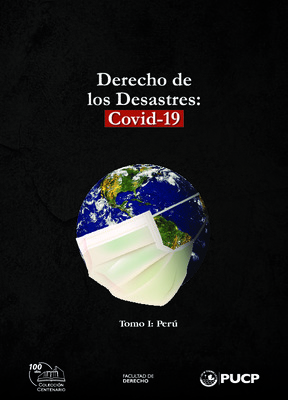| dc.contributor.advisor | Constantino Caycho, Renato Antonio | |
| dc.contributor.author | Tovar Parada, Miriam Estefanía | |
| dc.date.accessioned | 2024-03-13T14:03:04Z | |
| dc.date.available | 2024-03-13T14:03:04Z | |
| dc.date.created | 2023 | |
| dc.date.issued | 2024-03-13 | |
| dc.identifier.uri | http://hdl.handle.net/20.500.12404/27325 | |
| dc.description.abstract | El presente ensayo busca determinar si la interpretación evolutiva es una
interpretación válida a pesar de no estar reconocida explícitamente en la
Convención de Viena sobre el Derecho de los Tratados de 1969. Ello con la
finalidad de analizar como la Corte Interamericana de Derechos Humanos ha
hecho uso de la interpretación evolutiva en todos los casos referentes a la
Comunidad LGTBIQ para posteriormente, examinar si este uso de la
interpretación evolutiva se hace de manera correcta a efectos de determinar la
responsabilidad internacional de los Estados o responder la interrogante de si la
argumentación que utiliza la Corte IDH para responsabilizar a un Estado
internacionalmente es la más estratégica o tiene otras formas más robustas de
hacerlo.
El trabajo parte de la hipótesis de que la Corte Interamericana de Derechos
Humanos aplica el estándar de que la orientación sexual es una categoría
prohibida de discriminación de manera retroactiva a todos los casos de la
comunidad LGTBIQ. Asimismo, parte de que la Corte Interamericana de
Derechos Humanos reconoce implícitamente la debilidad de su argumento, por
lo que hace uso de argumentos auxiliares o complementarios a efectos de ir
consolidando su estándar con el tiempo. Esta hipótesis fue finalmente
corroborada, por lo que se propone como recomendaciones que la Corte
Interamericana utilice, cuando en los casos en los que sea posible, la norma
interna más protectora que su estándar retroactivo y como segunda
recomendación que la aplicación de un estándar nuevo se aplique para
resoluciones futuras lo que brinda seguridad jurídica a los Estados. | es_ES |
| dc.description.abstract | This essay seeks to determine the validity of evolutionary interpretation despite
its lack of explicit recognition in the 1969 Vienna Convention on the Law of
Treaties. The aim is to analyze how the Inter-American Court of Human Rights
(IACHR) has employed evolutionary interpretation in cases involving the
LGBTQ+ community. Subsequently, an examination is conducted to assess
whether this use of evolutionary interpretation is carried out correctly in
determining the international responsibility of states. Furthermore, the essay
explores whether the IACHR's argumentation for holding a state accountable
internationally is the most strategic or if alternative, more robust approaches exist.
The underlying hypothesis posits that the IACHR retroactively applies the
standard that sexual orientation is a prohibited category of discrimination to all
LGBTQ+ cases. Additionally, it posits that the IACHR implicitly acknowledges the
weakness of its argument, resorting to auxiliary or complementary arguments to
progressively solidify its standard over time. With the hypothesis validated,
recommendations are proposed for the IACHR to utilize, when feasible, the most
protective domestic norm rather than its retroactive standard. A secondary
recommendation suggests that the application of a new standard be reserved for
future resolutions, thereby enhancing legal certainty for states. | es_ES |
| dc.description.uri | Trabajo académico | es_ES |
| dc.language.iso | spa | es_ES |
| dc.publisher | Pontificia Universidad Católica del Perú | es_ES |
| dc.rights | info:eu-repo/semantics/openAccess | es_ES |
| dc.rights.uri | http://creativecommons.org/licenses/by-nc/2.5/pe/ | * |
| dc.subject | Corte Interamericana de Derechos Humanos | es_ES |
| dc.subject | Orientación sexual | es_ES |
| dc.subject | Discriminación sexual | es_ES |
| dc.subject | Derecho internacional y derechos humanos | es_ES |
| dc.title | Interpretación evolutiva en el Derecho Internacional de los Derechos Humanos: Un estudio de casos de la comunidad LGTBIQ por la Corte Interamericana de Derechos Humanos sobre la orientación sexual como categoría prohibida de discriminación | es_ES |
| dc.type | info:eu-repo/semantics/bachelorThesis | es_ES |
| thesis.degree.name | Segunda Especialidad en Derecho Internacional Público | es_ES |
| thesis.degree.level | Título Profesional | es_ES |
| thesis.degree.grantor | Pontificia Universidad Católica del Perú. Facultad de Derecho | es_ES |
| thesis.degree.discipline | Derecho Internacional Público | es_ES |
| dc.type.other | Trabajo académico de segunda especialidad | |
| dc.subject.ocde | https://purl.org/pe-repo/ocde/ford#5.05.01 | es_ES |
| dc.publisher.country | PE | es_ES |
| renati.advisor.dni | 46049208 | |
| renati.advisor.orcid | https://orcid.org/0000-0002-5721-1541 | es_ES |
| renati.author.dni | 77500318 | |
| renati.discipline | 421069 | es_ES |
| renati.level | https://purl.org/pe-repo/renati/level#tituloSegundaEspecialidad | es_ES |
| renati.type | https://purl.org/pe-repo/renati/type#trabajoAcademico | es_ES |




